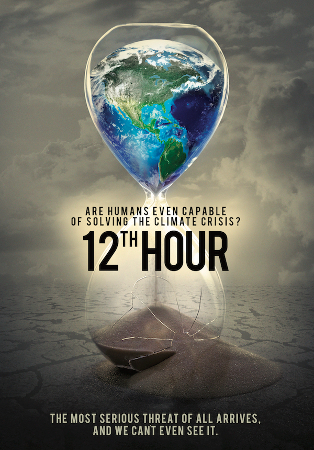
12th Hour 2021
Distributed by The Video Project, 145 - 9th St., Suite 230, San Francisco, CA 94103; 800-475-2638
Produced by Jim Swift
Directed by Susan Kucera
Streaming, 52 mins
College - General Adult
Anthropology; Ecology
Date Entered: 12/09/2021
Reviewed by Abbey B. Lewis, STEM Learning & Collections Librarian, University of Colorado BoulderThere are lots of questions worth asking about the climate crisis from how governments and industries should be held accountable to the limitations of science in creating solutions to an ever-worsening problem. The question asked by 12th Hour is one of the most unsettling: Given the same evolutionary traits that have allowed humankind to thrive, are we actually capable of effectively responding to climate change? The film makes an attempt to reconcile who we are, biologically-speaking, with what we know about our situation on this planet, leaving an inevitably uncertain ending. This isn’t our question to answer, after all, but one that will certainly be asked by any future generation that might exist.
The film begins by examining the beginnings of modern human life and the problems and capabilities of people who lived in a world strikingly different from our own. As stated in the narration, “Stone age people didn’t worry about the future, they were focused on present needs. Short-term survival thinking and immediate gratification. We’re still the same.” Our focus on present needs and immediate gratification looks different than those of our ancestors, but still prevent us from engaging in the type of problem-solving that could address a threat like climate change that operates in an extended time frame.
This angle of examining our capability to respond to climate change through the lens of evolution is nicely situated, but 12th Hour’s method of carrying out the examination falls short. Ultimately, the film relies a bit too heavily on big names saying smart things. Richard Dawkins, William Catton and plenty of others offer disturbingly true statements, speaking directly from their individual areas of expertise. Their insights are as worthwhile and intelligent as one might expect, but cumulatively they undermine the film’s ability to cover its intended topic in-depth and the message falters a bit as speakers verge on restating each other’s ideas. There’s a lingering sense that the filmmakers devoted more energy to capturing perfect sound bites from notable academics than to crafting a film that provides a thorough examination of our psychological and intellectual limitations in grappling with climate change.
12th Hour is suitable for higher education classrooms when used in a manner meant to illuminate other materials and more thorough inquiry into issues surrounding climate change. It is recommended with reservations because content is limited when covering harrowing ideas that deserve more detailed investigation. However, overused as they may have been, those sound bites will echo in students’ minds once human capabilities in responding to climate are more fully explored.
Published and licensed under the Creative Commons Attribution 4.0 license. Anyone can use these reviews, so long as they comply with the terms of the license.